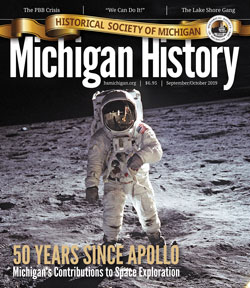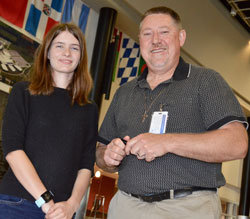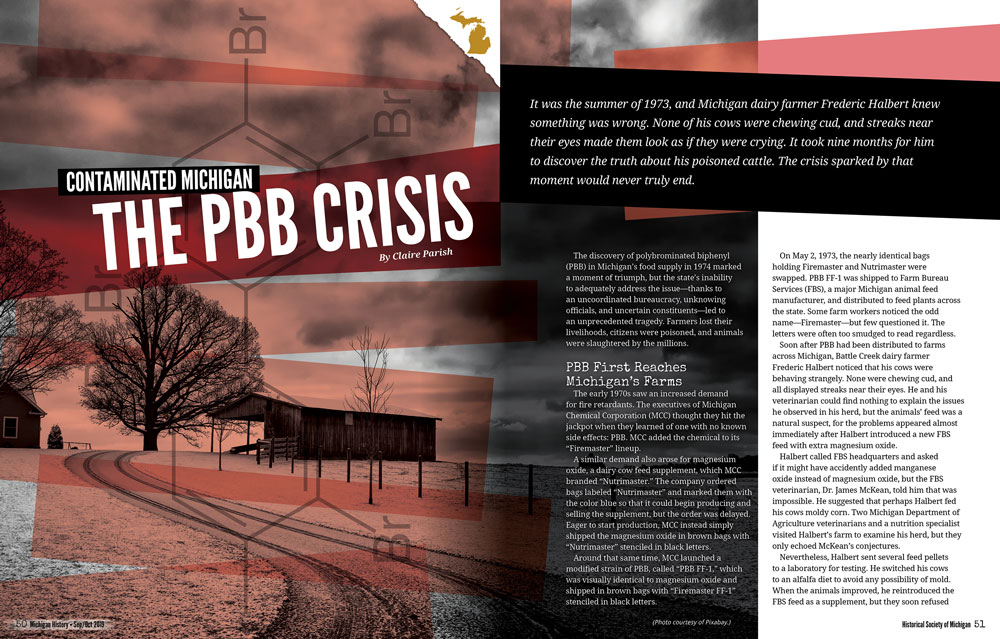Claire Parish has been hooked on National History Day programs since middle school. And her dedication shows: Her projects have made it to the national level of competition every year.
“I like that you can go in-depth and really learn about things you care about, like nothing else you could possibly do as part of a regular class,” she said. “It was the first time I was told, ‘Find something weird that you’re interested in and spend a lot of time researching it.’ I just really like that.”
Last year was a little different, but in a very good way.
After she submitted her paper on the state’s PBB crisis as her focus of the prompt “Triumph and Tragedy in History,” at the state round of competition, she got an email from the director of education at the Historical Society of Michigan. If Claire gave the go-ahead, they wanted to publish it in the Michigan History magazine
“I wrote back that, well, ‘That’s amazing, thank you so much, wow.’ I wouldn’t ever have imagined I could be published in those sorts of magazines. I can’t really wrap my head around it.”
The Eastern High School senior’s article is published in the September/October issue. It’s the first time a K-12 student has been published there since at least 2009, the year the Historical Society of Michigan took over production of the magazine.
“We have no problem publishing young authors as long as their work is well written and well researched,” said Nancy Feldbush, editor in chief and creative director. And while the magazine usually publishes first-time authors in its membership magazine, Chronicle, she said, “there are times, though, that a first-time author’s work stands out.”
“Claire’s work stood out because it was well-written, well-researched, and well-told — and its subject matter was so important that the editorial committee wanted to make sure it reached as broad an audience as possible.”
A Topic, A Mentor, A Source
PBB, or polybrominated biphenyl, was a fire retardant that in 1973 was mistakenly shipped to a livestock feed plant. Because it took about a year to discover the mistake, millions of Michiganders ate contaminated beef, chicken, pork, milk and eggs. The chemical has long-lasting, toxic effects.
After Claire Parish decided to investigate PBB last year for her Michigan history project, she turned to her former Eastern Middle School teacher Jim Cross for guidance.
Cross was a 12-year-old “stick-thin farm kid (who) ate our homegrown eggs daily and drank the milk from a neighboring dairy farm like it was going out of style,” he said. His family lost cattle, sheep, chickens and other animals to the poisoning. Today he wonders “whether my many health issues or those of my kids and grandkids are related to PBB.
”Reading Claire’s research, Cross said, led him to conclude that “she certainly has much more knowledge than I or my family ever had. It was really neat to read about something from my own childhood and realize all that I didn’t know about it.”
“I have had several historians who have decades of experience tell me how impressed they were with Claire’s article,” Feldbush added. “One told me that it was one of the best articles he has ever read” in the magazine.

Writing: Her Original Thing
Claire has set her sights after high school on pursuing a career in environmental law. But she said writing was “her original thing.”
“I was in ATYP — the academically talented youth program for writing — and freshman year I was in AP language, a junior level class. I really enjoy taking all these different written works and trying to sum up a book in a sentence. And make it sound interesting, make it a story.”
Her most recent writing accolade comes with a few perks: five copies of the print version and a check for “a little bit over $200.” And it’s not the only, or the largest amount she has been paid to sling words. “Last year, for a website my partner and I made (for the same competition), we won the global peace prize at the national level: a $1,000 prize divided between the two of us.”

Claire credits eighth grade challenge social studies teacher Jim Cross with sparking and supporting her National History Day efforts. “He’s always been a great resource for when I don’t know what I’m doing, and he has helped keep me on track.”
Cross had high praise for Claire, too.
“She is a quiet and unassuming young lady in school,” he wrote in an email. “She is bright and disciplined, and a talented writer, but I think what has most impacted her success in National History Day is her conceptual vision of how to go from big, general knowledge to that deeper level that gets you to the heart of the topic.”
That along with her research skills and great writing has led to Claire’s success in National History Day and school in general, Cross said, adding, “Even with all her success, she has remained very humble.”










